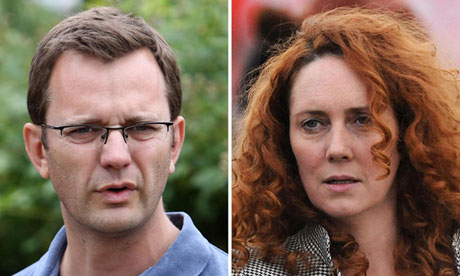Rebekah Brooks is guilty
As by extension, is also her boss, Rupert Murdoch. Although she may not have been aware of the phone tapping by her staff, she is still guilty of running an organisation where the production of stories, no questions asked, is the overriding criteria for success. The News of the World was not a work environment where ethical behaviour on the part its employees was the  overriding criteria for advancement. That former News International editors Andy Coulson and Rebekah Brooks, among five charged over alleged corrupt payments to public officials by journalists, may be found guilty on these charges is not why she is accused in this blog . She is guilty of creating an unethical organisation
overriding criteria for advancement. That former News International editors Andy Coulson and Rebekah Brooks, among five charged over alleged corrupt payments to public officials by journalists, may be found guilty on these charges is not why she is accused in this blog . She is guilty of creating an unethical organisation
 overriding criteria for advancement. That former News International editors Andy Coulson and Rebekah Brooks, among five charged over alleged corrupt payments to public officials by journalists, may be found guilty on these charges is not why she is accused in this blog . She is guilty of creating an unethical organisation
overriding criteria for advancement. That former News International editors Andy Coulson and Rebekah Brooks, among five charged over alleged corrupt payments to public officials by journalists, may be found guilty on these charges is not why she is accused in this blog . She is guilty of creating an unethical organisation
We all know from our own work experiences that ethical behaviour is not always the norm - that personal contribution to the organisation, and maximisation of profits take precedence. We are aware that the organisation’s code of ethics is a creative document drawn up by its publicity department. That the ‘discounted’ price may not be a true discount; the quality of the work may be less than advertised; that the outcry against the new tax is purely self-serving.
.
A recent investigation into people who spoke out against wrongdoing in the Australian public service has confirmed this intuitive knowledge. This research comprised nine surveys across the public service, the largest of which sent out 23,177 questionnaires to public servants in 118 agencies, to which 7663 public servants responded. The research was organised by fourteen state and federal government ombudsman and anti-corruption agencies, along with five universities. It found that senior managers and staff responsible for managing ethical behaviour in public agencies believe that whistleblowing is the most useful way to identify and stop wrongdoing. One of the more important findings of this study, however, was the enormous variations in the treatment accorded whistleblowers. In some agencies the negative impact of whistleblowing is less than 10%; in other agencies it can be as high as 50% .In effect, some government departments listen to and act on people in the organisation who speak out against wrongdoing. Other agencies ignore the complaint, even take action against the whistleblower.
In Rebekah Brooks’ News of the World there would be little doubt that any employee who spoke out against wrongdoings by the paper would have shortened their career prospects by a substantial margin.. Rebekah Brooks tells us that did not know about the phone tapping. The reason may well be that she did nothing to encourage people to speak out against this or any other dubious activity .If she had, Clive Goodman, an editor, would not have served time in prison for phone hacking ; nor would Neville Thurlbeck and Ian Edmondsen been arrested on suspicion of phone hacking.
News Limited has a Code of Conduct .John Hartigan ,Chairman and Chief Executive of News Limited in Australia has put out a press release citing the Code of Conduct as the reason why the remainder of Rupert Murdoch’s empire is squeaky clean:
Given the wider reputational impact on all journalists as a result of the events in the UK I want to remind everyone that adherence to our ethical code is fundamental to our right to publish and a fundamental requirement of our work, every day.
Rebekah Brooks, who enjoys Rupert’s full support, apparently has not read it. Or as is more than likely, she wrote it. But organisational behaviour needs to go beyond a code of ethics written by a senior executive putting forward a picture image for public consumption. .
Ethical behaviour is as dominant a requirement on the media as it is on any professional body. They influence our attitudes to many of our activities. For many of us, they are the sole information source for the decision - on international conflicts; foreign aid, political parties, even how we vote. The reluctance by politicians to anger powerful media barons was acknowledged with unusual candor recently by the British Prime Minister, David Cameron, who told a news conference that The News of the World scandal showed the importance of ending what he called the “cozy” relationship in Britain between the media, politicians and the police. Code of ethics only work when they target actual ethical confrontations experienced by employees. John Hartigan did not, and I suspect cannot, tell us that News Limited forbids the hacking of a mobile phones belonging to celebrities, victims of crime, terrorism and even relatives of soldiers killed in action.

